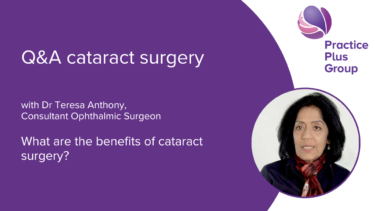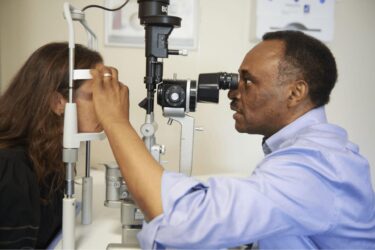Estimated reading time: 3 minutes
“Most of us who have healthy eyesight are extremely attached to our vision, often without being conscious that we are. We depend heavily on our eyes, and yet we rarely give them a second thought.”
These are the words of celebrated American novelist, Rosemary Mahoney about the often overlooked importance of good eyesight. If you’re struggling with fuzzy, clouded vision, your thoughts may be turning towards solving the issue. A solution may be cataract surgery, so, one of the questions you might be weighing up is whether to have cataract surgery via the NHS or privately.
This article examines the pros and cons of both options while aiming to inform and, ultimately, help you make a decision.

Understanding cataract surgery – what’s the same?
The cataract surgery and actual procedure itself remains the same regardless of whether you’re on a private or NHS patient pathway. For NHS patients, there may be differences with regards to the types of lenses available to you, but when it comes to the surgery itself, i.e. removing the cataract and vision correction in general, there aren’t any differences between private and NHS.
Clinical quality and success rates
Cataract surgery enjoys a very high success rate regardless of whether you’re receiving treatment privately or via the NHS. According to the NHS website,1 just one in 1,000 patients suffer permanent sight loss as a result of cataract surgery.
NHS vs private cataract surgery – what’s different?
While the surgery itself stays the same, there are differences that are well worth noting. For example, it’s highly likely private cataract surgery will have a much shorter waiting list. On the other hand, one of the disadvantages of opting to have your healthcare privately is having to cover the cost yourself. Take a look at the sections below for a rundown of the differences.
Costs
Perhaps the main difference is costs. NHS patients do not have to pay for their treatment but those opting for private surgery do. Private cataract surgery costs range from around £2,000 to upwards of £4,000 per eye, depending on the healthcare provider and the type of lens you’re having.
There are two ways to pay:
- You can pay for yourself in a single one-off lump or one of our finance options.
- Pre-existing health insurance can be used to cover the cost of treatment.
At Practice Plus Group, private cataract surgery starts from £1,995 per eye for a standard monofocal lens.
Waiting times
The other major difference (and benefit) of having your cataract surgery privately is the waiting times. These are often much shorter than those with the NHS. This applies to the initial consultation as well as the actual surgery.
For example, the current waiting time for cataract surgery on the NHS at the Royal Devon University NHS Healthcare Trust is 37 weeks. This is 19 weeks for a consultation and, from there, 18 weeks until the surgery. Waiting times on the NHS vary depending on location and can be tracked using the My Planned Care website.2
(Practice Plus Group is not responsible for and does not control the content displayed on external websites.)
At Practice Plus Group, you’ll be waiting around 1-2 weeks for a consultation. After that, it’s just a 4-6 week wait for your surgery.
Eligibility criteria
The majority of people with cataracts will be deemed eligible for surgery. However, there are a handful of reasons as to why you may not be suitable. These include patients who:
- are in poor general health or have a serious pre-existing medical condition
- have advanced macular degeneration
- have a detached retina.
Availability and booking flexibility
Another way that private healthcare differs from the NHS is the flexibility when it comes to the time and date of the surgery. With private healthcare, you have the opportunity to choose to have your treatment on a day and at a time that suits you. This makes planning your recovery (and organising help and support) much more straightforward.
The referral process
If you’re having your cataract surgery with the NHS, it’s highly likely you’ll need a GP referral in order to access an initial consultation with us. This can add weeks to your waiting time if you live in an area of high GP demand.
Opting for the private healthcare route often means you do not need a GP referral. You can self-refer by indicating your condition when submitting an online enquiry form or calling up. A specialist will then be able to arrive at a diagnosis during your initial cataract consultation.
Your choice of cataract consultant
Private cataract surgery patients also enjoy the benefit of being able to choose their cataract consultant. Having your own choice of consultant gives you the opportunity to pick a surgeon with experience and knowledge in your specific type of treatment.
And, with the power of the internet, word of mouth, and past patient recommendations, finding a cataract surgeon to suit your needs has never been easier.
Available cataract lens types
Generally speaking, there is more choice of cataract lenses for private patients. For example, NHS patients seeking their NHS treatment via Practice Plus Group hospitals are limited to the standard monofocal lens.
Private patients can choose the best cataract lens type from a range of different lenses depending on their specific needs and any pre-existing issues with their eyesight. Some are designed to correct distance vision, while others will reduce the reliance on wearing glasses or the need for contact lenses. The following are available privately with Practice Plus Group:
- Standard monofocal lens
- Enhanced monofocal lens
- Multifocal lens
- Multifocal toric lens
- Enhanced depth of field lens
- Enhanced depth of field toric lens
- Bilateral lens
Care, aftercare, and patient experience
At a Practice Plus Group hospital, immediately after your operation, you will be able to see through the eye that’s been operated on. However, it’s likely the vision will be blurred. This is because your pupil will still be dilated.
After an hour or so, you should be able to go home. If you receive general anaesthetic, you’ll likely be kept in hospital until you are fully awake. As your vision will still be blurred after the operation, a responsible adult must take you home and stay with you for at least 24 hours. If the eye is uncomfortable, please use your normal pain tablets.
While recovering from cataract surgery, you’ll be given post-operative eye drops and instructions as to how to apply them.
If you wear glasses or contact lenses, your consultant will be able to advise as to whether you should continue to use them in the short-term.
Patient testimonial
“It’s not ideal to pay for your own surgery but my cataracts weren’t bad enough [for NHS treatment]. I still wanted to improve my vision though and decided to have surgery on my non-dominant right eye to see what results I could get.”
Shane Hallett, cataract surgery patient at Practice Plus Group Hospital, Shepton Mallet
Which is better?
While it might seem like a bit of a cop-out, the answer to this question really does depend on your own personal circumstances. The factors below represent just a handful of aspects you’ll need to take into account when deciding on the best option for you:
- Quality of life: if cataracts are stopping you from doing the things you enjoy, then it might be worth considering going private
- Financial situation: during a cost of living crisis, every penny counts and everyone’s financial circumstances are different. The big advantage of NHS healthcare is that it’s free, however, you may face a long wait before you can undergo surgery
- Availability of lenses: there are quite a few different lenses on offer when it comes to treating cataracts. You’ll need to decide which lens is best for you and find out if it’s available at the hospital or healthcare provider of your choice.
Sources and references
1 https://www.nhs.uk/conditions/cataract-surgery/
2 https://www.myplannedcare.nhs.uk/

Acknowledgements
FAQs about cataract surgery
Haven’t found the information you’re looking for? Perhaps our cataract surgery FAQs can help.
You will need to get this from your GP. If cataract surgery is needed, he or she will then be able to refer you to the NHS for treatment.
NHS waiting times vary depending on where you are in the UK. For example, the current waiting time for ophthalmology treatment at South Tees NHS Foundation Trust is 28 weeks from referral. Whereas at Ashford and St Peter’s NHS Hospital, you can expect to wait around 40 weeks.
This depends entirely on your own personal circumstance. Factors such as financial situation, how much cataracts are affecting your quality of life, and the availability of different cataract lenses should all be considered before making a decision.






